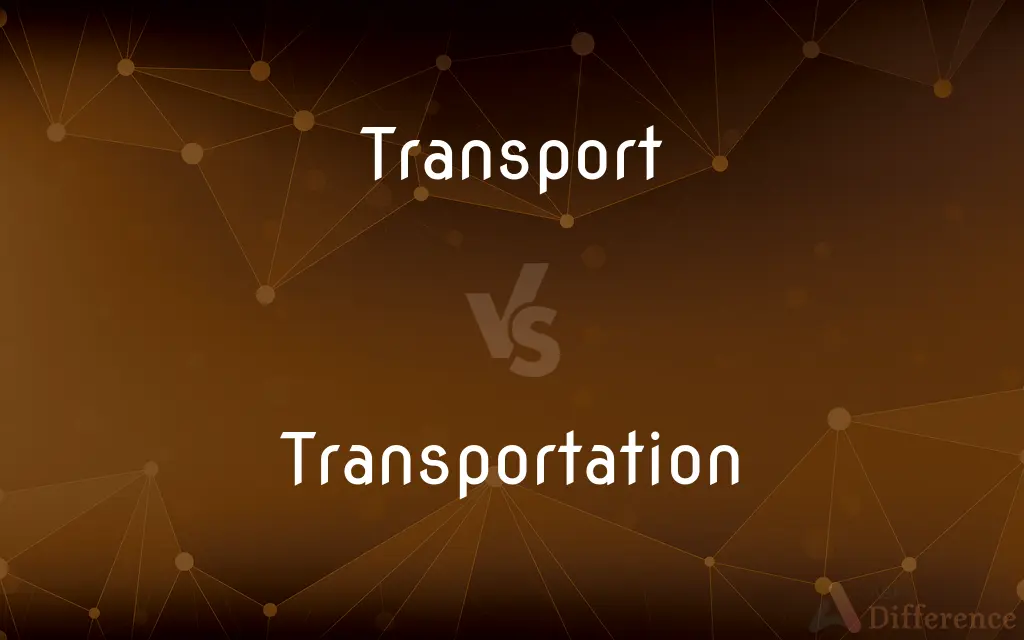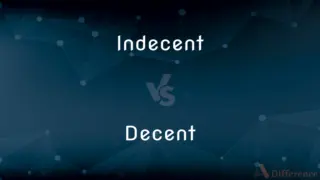Transport vs. Transportation — What's the Difference?
Edited by Tayyaba Rehman — By Fiza Rafique — Updated on September 21, 2023
"Transport" refers to the act or process of moving people or goods from one place to another. "Transportation" typically refers to the system or means by which this movement is accomplished.

Difference Between Transport and Transportation
Table of Contents
ADVERTISEMENT
Key Differences
"Transport" is commonly used to describe the act or process of moving something or someone from one location to another. It can refer to a single journey or a specific instance of transporting goods or people. On the other hand, "transportation" often implies a broader context, encompassing the system, infrastructure, or means by which transport occurs. It can refer to the overall network of roads, railroads, or public transit.
Both "transport" and "transportation" can be used in various contexts, including logistics, travel, and urban planning. However, "transport" usually concentrates on the action or instance of moving, whereas "transportation" tends to focus more on the overarching system, including various modes like buses, trains, or airplanes.
Another subtle difference between the two terms is their grammatical usage. "Transport" can serve as both a noun and a verb. You can transport goods and also provide transport. "Transportation," in contrast, is predominantly used as a noun, referring to the means or system of transport. It does not function as a verb.
Although "transport" and "transportation" are often used interchangeably, especially in everyday language, the two terms have nuanced differences that are more evident in specialized or technical contexts. For instance, a logistics company may offer "transport services," while a city government may invest in "transportation infrastructure."
Comparison Chart
Focus
Action, instance
System, method
ADVERTISEMENT
Context
Specific journey or movement
Overall network or infrastructure
Grammatical Role
Noun and Verb
Mainly a Noun
Usage in Specialized Contexts
Often in logistics or specific services
In urban planning or policy
Related Terms
Transport goods, transport services
Transportation system, transportation network
Compare with Definitions
Transport
The act of moving goods or people from one place to another.
The transport of supplies was delayed due to weather.
Transportation
The act of transporting something from one location to another.
The transportation of hazardous materials requires special permits.
Transport
A vehicle used for transferring or carrying goods.
The transport arrived at the warehouse on time.
Transportation
The field or industry related to moving people or goods.
She works in the transportation sector.
Transport
A strong emotional or physical state induced by an experience.
She was in a transport of delight upon hearing the news.
Transportation
The system or means for moving people or goods.
The city is investing in new transportation initiatives.
Transport
The system or means by which people or goods are moved.
Public transport is crucial for urban mobility.
Transportation
The infrastructure supporting the movement of goods or people.
The transportation network needs significant upgrades.
Transport
Transport (BE) or transportation (AE) is the movement of humans, animals, and goods from one location to another. In other words, the action of transport is defined as a particular movement of an organism or thing from a point A (a place in space) to a point B. Modes of transport include air, land (rail and road), water, cable, pipeline, and space.
Transportation
The act or an instance of transporting.
Transport
Take or carry (people or goods) from one place to another by means of a vehicle, aircraft, or ship
The bulk of freight traffic was transported by lorry
Transportation
The state of being transported.
Transport
Overwhelm (someone) with a strong emotion, especially joy
She was transported with pleasure
Transportation
A means of conveyance
What kind of transportation did you take?.
Transport
A system or means of conveying people or goods from place to place
Air transport
Many possess their own forms of transport
Transportation
The business of conveying passengers or goods
He works in transportation.
Transport
An overwhelmingly strong emotion
Art can send people into transports of delight
Transportation
Deportation to a penal colony.
Transport
To move or carry (goods, for example) from one place to another; convey.
Transportation
The act of transporting, or the state of being transported; conveyance, often of people, goods etc.
We have to get people out of their cars and encourage them to use alternative forms of transportation.
Transport
To cause to feel strong emotion, especially joy; carry away; enrapture.
Transportation
(historical) Deportation to a penal colony.
Mulligan's sentence was commuted from death to transportation.
Transport
To send abroad to a penal colony; deport.
Transportation
(US) A means of conveyance.
Nice transportation, dude, but your brake lights are busted.
Transport
The act of transporting; conveyance.
Transportation
(US) A ticket or fare.
Transport
The condition of being transported by emotion; joy or rapture.
Transportation
The act of transporting, or the state of being transported; carriage from one place to another; removal; conveyance.
To provide a vessel for their transportation.
Transport
A ship or aircraft used to transport troops or military equipment.
Transportation
Transport; ecstasy.
Transport
A vehicle, such as an aircraft, used to transport passengers, mail, or freight.
Transportation
A facility consisting of the means and equipment necessary for the movement of passengers or goods
Transport
The system of transporting passengers or goods in a particular country or area.
Transportation
The act of transporting something from one location to another
Transport
The vehicles, such as buses and trains, used in such a system.
Transportation
The sum charged for riding in a public conveyance
Transport
A deported convict.
Transportation
The United States federal department that institutes and coordinates national transportation programs; created in 1966
Transport
To carry or bear from one place to another; to remove; to convey.
To transport goods; to transport troops
Transportation
The commercial enterprise of transporting goods and materials
Transport
(historical) To deport to a penal colony.
Transportation
The act of expelling a person from their native land;
Men in exile dream of hope
His deportation to a penal colony
The expatriation of wealthy farmers
The sentence was one of transportation for life
Transport
(figuratively) To move (someone) to strong emotion; to carry away.
Music transports the soul.
Transportation
A vehicle or set of vehicles used for transporting.
The company has an extensive transportation fleet.
Transport
An act of transporting; conveyance.
Transport
The state of being transported by emotion; rapture.
Transport
A vehicle used to transport (passengers, mail, freight, troops etc.)
Transport
(Canada) A tractor-trailer.
Transport
The system of transporting passengers, etc. in a particular region; the vehicles used in such a system.
Transport
A device that moves recording tape across the read/write heads of a tape recorder or video recorder etc.
Transport
(historical) A deported convict.
Transport
To carry or bear from one place to another; to remove; to convey; as, to transport goods; to transport troops.
Transport
To carry, or cause to be carried, into banishment, as a criminal; to banish.
Transport
To carry away with vehement emotion, as joy, sorrow, complacency, anger, etc.; to ravish with pleasure or ecstasy; as, music transports the soul.
[They] laugh as if transported with some fitOf passion.
We shall then be transported with a nobler . . . wonder.
Transport
Transportation; carriage; conveyance.
The Romans . . . stipulated with the Carthaginians to furnish them with ships for transport and war.
Transport
A vessel employed for transporting, especially for carrying soldiers, warlike stores, or provisions, from one place to another, or to convey convicts to their destination; - called also transport ship, transport vessel.
Transport
Vehement emotion; passion; ecstasy; rapture.
With transport views the airy rule his own,And swells on an imaginary throne.
Say not, in transports of despair,That all your hopes are fled.
Transport
A convict transported, or sentenced to exile.
Transport
Something that serves as a means of transportation
Transport
An exchange of molecules (and their kinetic energy and momentum) across the boundary between adjacent layers of a fluid or across cell membranes
Transport
The commercial enterprise of transporting goods and materials
Transport
A state of being carried away by overwhelming emotion;
Listening to sweet music in a perfect rapture
Transport
A mechanism that transport magnetic tape across the read/write heads of a tape playback/recorder
Transport
Move something or somebody around; usually over long distances
Transport
Move while supporting, either in a vehicle or in one's hands or on one's body;
You must carry your camping gear
Carry the suitcases to the car
This train is carrying nuclear waste
These pipes carry waste water into the river
Transport
Hold spellbound
Transport
Transport commercially
Transport
Send from one person or place to another;
Transmit a message
Transport
To carry, convey, or move from one place to another.
We need to transport the equipment to the event venue.
Common Curiosities
Is transportation used as a verb?
No, "transportation" is primarily used as a noun.
Can transport be used as a verb?
Yes, "transport" can function as both a noun and a verb.
Is transport the same as transportation?
While similar, transport focuses on the action, and transportation emphasizes the system or method.
Which term is used in urban planning?
"Transportation" is commonly used in urban planning and policy contexts.
Does transportation include infrastructure?
Yes, transportation often implies the existence of a supporting infrastructure like roads or railways.
Is transportation more comprehensive?
Yes, transportation often refers to the overall system, including infrastructure and multiple modes.
Which term is used in logistics?
The term "transport" is often used in the context of logistics.
What is transport?
Transport refers to the act or process of moving people or goods from one place to another.
What is transportation?
Transportation generally refers to the system or means by which people or goods are moved.
Is transport more specific than transportation?
Generally, "transport" is more specific, often referring to a single journey or instance.
Can transport refer to emotional states?
Yes, "transport" can also mean a strong emotional or physical state induced by an experience.
Can these terms be used interchangeably?
While often used interchangeably, especially in everyday language, the terms have nuanced differences.
Do both terms relate to vehicles?
Yes, both "transport" and "transportation" can refer to vehicles used for moving people or goods.
Can transport refer to a service?
Yes, "transport" can refer to a service that moves goods or people.
Is transportation used in government policy?
Yes, "transportation" often appears in the context of government policy and public works.
Share Your Discovery

Previous Comparison
Polymer vs. Ceramic
Next Comparison
Indecent vs. DecentAuthor Spotlight
Written by
Fiza RafiqueFiza Rafique is a skilled content writer at AskDifference.com, where she meticulously refines and enhances written pieces. Drawing from her vast editorial expertise, Fiza ensures clarity, accuracy, and precision in every article. Passionate about language, she continually seeks to elevate the quality of content for readers worldwide.
Edited by
Tayyaba RehmanTayyaba Rehman is a distinguished writer, currently serving as a primary contributor to askdifference.com. As a researcher in semantics and etymology, Tayyaba's passion for the complexity of languages and their distinctions has found a perfect home on the platform. Tayyaba delves into the intricacies of language, distinguishing between commonly confused words and phrases, thereby providing clarity for readers worldwide.














































